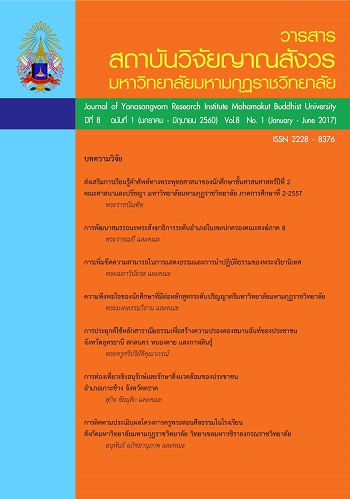THE SUPPORT LEARNING VOCABURALY BUDDHISM OF SECOND YEARS STUDENTS ,FACULTY OF RELIGION AND PHILOSOPHY, MAHAMAKUT BUDDHIST UNIVERSITY,SEMESTER 2/2557
Main Article Content
Abstract
This research was of its objectives 1) to study the learning of The Buddhist terminology (or Pa̅lı̅ Words) contributing to the process of learning the Buddhism subject of the BA Second year students, 2) to examine the satisfaction of learning Buddhism of the Same student group and 3) to analyze the learning behaviour caused by supporting learning the Buddhist terminology of the 9 monk/layperson students after their having learned Buddhism. It was the quasi-experimental research by means of one group trial. The equipment used consisted of a set of tests, a set the satisfaction measurement patterns and a set of the behaviour observation patterns. The statistics employed in analyzing data were comprised of frequency, percentage, mean or average and standardized derivation. The research results revealed that : 1. The learning effectiveness of the 9 monk/layperson students answering the questionnaires showed that 00.00% of them succeeded in learning at a very good level; 55.56% of them at a good level; 33.33 of them at a fair level and 11.11% of them at an improved level 2. The satisfaction of the students after their having employed the innovation was on the whole at a great level with the mean (X̅) at 3.59 and with its standardized derivation (SD) at 1.010. However, when each number of them was considered, it was found that the number with the highest average was 4, that is, in terms of the knowledge and skill in teaching, it had the mean (X̅) at 3.74 with its standardized derivation (SD) at .875 followed by the number 1 dealing with passing on the good knowledge with its mean (X̅) at 3.73 and with its standardized derivation (SD) at .996. In terms of the subject matter integration involved in teaching, it had the mean (X̅) at 3.64 with its standardized derivation (SD) at .812. As for the knowledge and skill in preparing the subject matter for teaching, it had the mean (X̅) at 3.42 with its standardized derivation (SD) at .963 and in the context of the personal quality, it had the mean (X̅) at 3.42 with its standardized derivation (SD) at 1.402 respectively. 3. The results of analyzing the learning behaviour of the students were found that they showed their behaviour towards learning the usage of the Buddhist terminology in support of studying Buddhism in an increasing way after their usage trial, which contributed to the higher knowledge and understanding based on the research hypothesis determined. So, it could be concluded as follows: 1. Orderliness - the students attended class on schedule; they kept clean their classroom; they were neatly dressed based on the university’s regulations. 2. Responsibility – they gave their assignment on schedule, they participated in the university activities. 3. Self-dependence – they were always interested in learning, could search for the internet information and could use computer technology well, 4. Diligence – they learned and searched for the information involved in each subject at the central library, met their advisor lecturer 1 hour per week, leading them to decrease in their being absent from class.
Article Details
References
ผศ.ดร.อรพิณ ศิริสัมพันธ์,การศึกษาพฤติกรรมการเรียนของนักศึกษา คณะศึกษาศาสตร์ มหาวิทยาลัยศิลปากร,รายงานการวิจัย,มหาวิทยาลัยศิลปากร, 2550
สิบโท ดร.พิศุทธิ์ บัวเปรม และสุชิรา นวลกำแหง,ศึกษาพฤติกรรมการเข้าเรียนของนักศึกษาสาขาวิชาเทคโนโลยีอุตสาหกรรมก่อสร้าง สาขาวิชาเทคโนโลยีอุตสาหกรรมก่อสร้าง คณะเทคโนโลยี การเกษตร,รายงานการวิจัย, มหาวิทยาลัยราชภัฏเพชรบูรณ์, 2555

